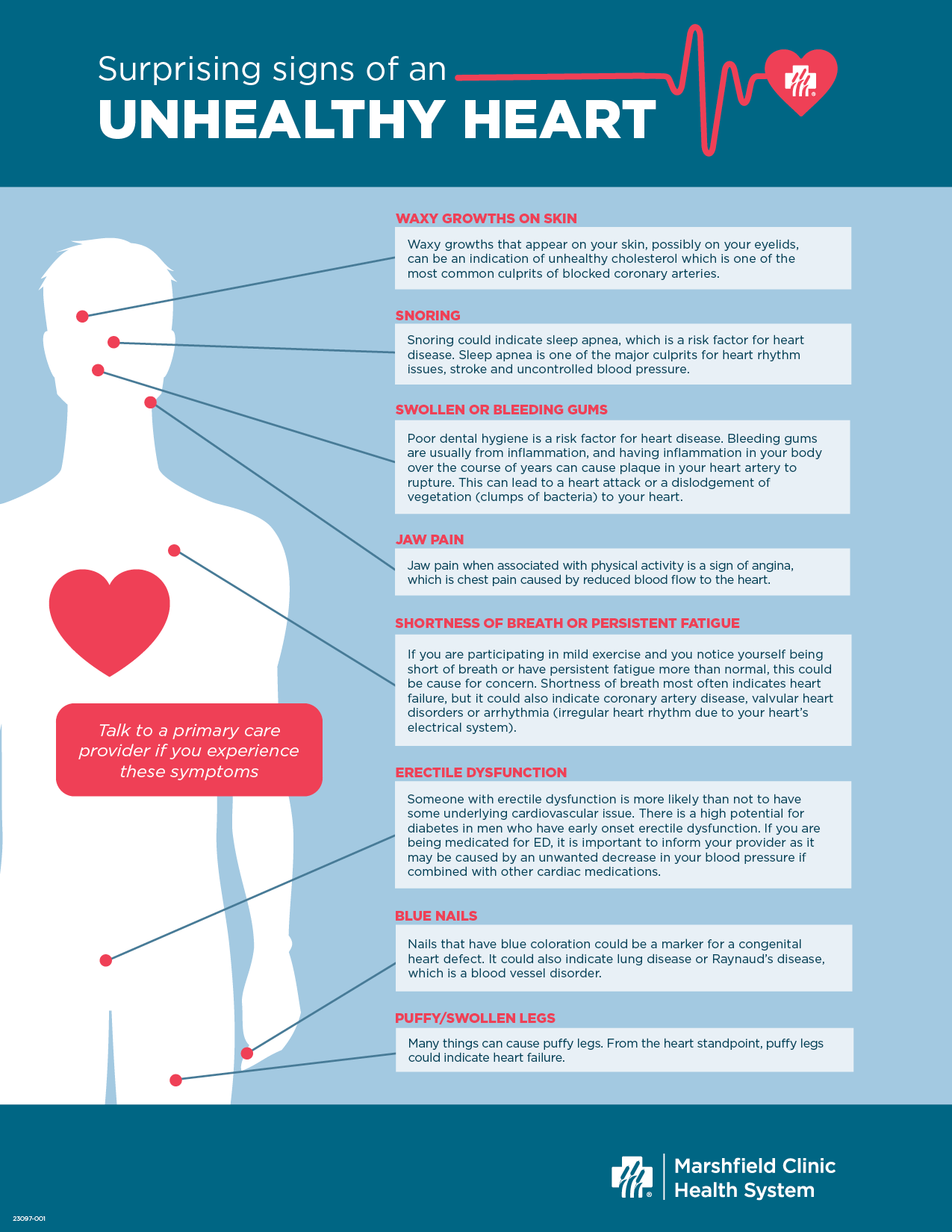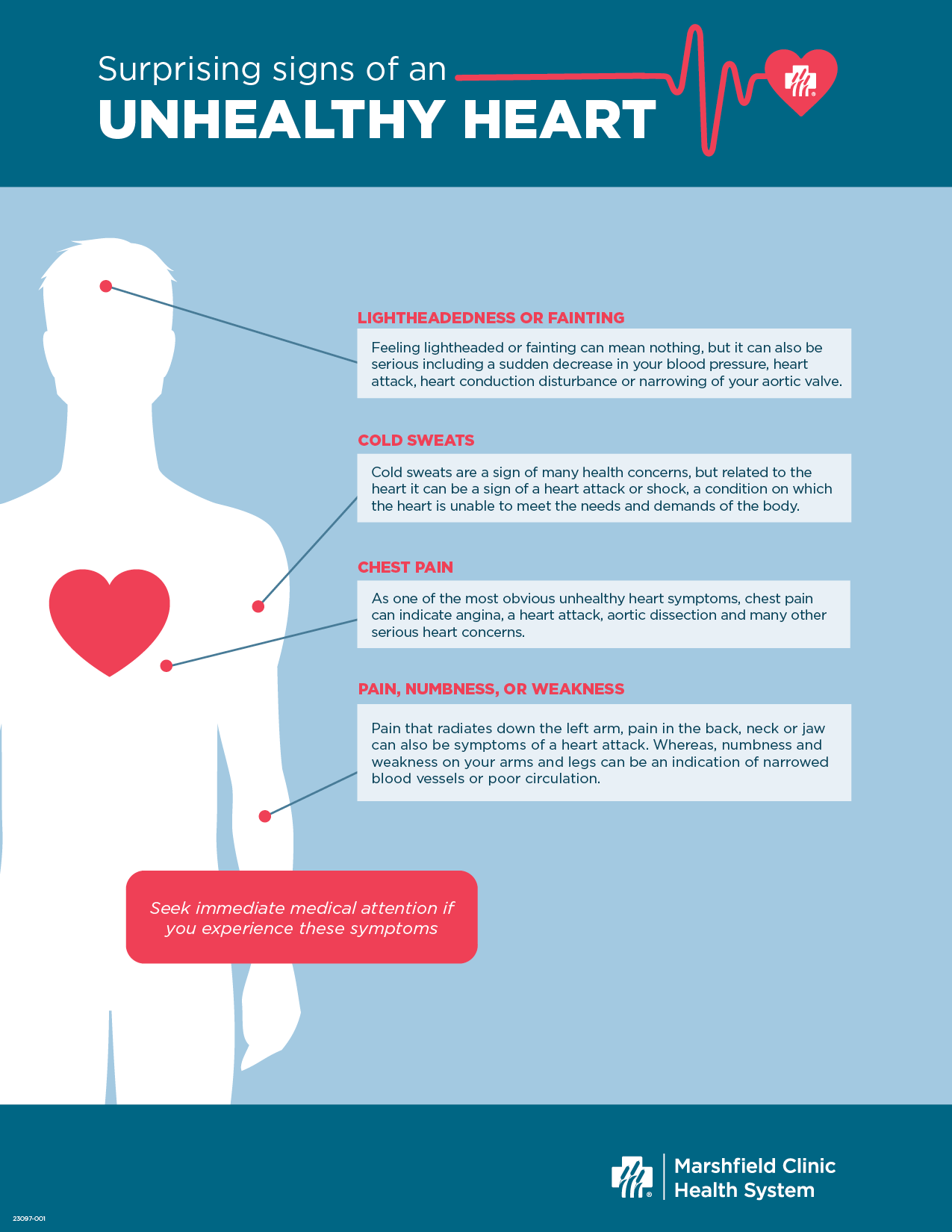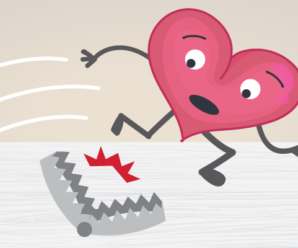You may recognize some of the common warning signs of heart trouble, like chest pain, shortness of breath, lightheadedness or persistent fatigue. But there are also lesser-known signs of an unhealthy heart you should know about.
“Many potential signs of heart trouble could also indicate health issues that are not heart related,” said Michelle Alikpala, a cardiology nurse practitioner at Marshfield Clinic Health System. “An important thing to remember is making sure you alert your health care team of any new or worsening symptoms you are experiencing.”
Below are symptoms that could indicate heart trouble.
Chest pain
As one of the most obvious unhealthy heart symptoms, chest pain can indicate angina, a heart attack, aortic dissection and many other serious heart concerns.
RELATED ARTICLE: What’s causing this pain in my chest?
Shortness of breath or persistent fatigue
If you are participating in mild exercise and you notice yourself being short of breath or have persistent fatigue more than normal, this could be cause for concern. Shortness of breath most often indicates heart failure, but it could also indicate coronary artery disease, valvular heart disorders or arrhythmia (irregular heart rhythm due to your heart’s electrical system).
RELATED ARTICLE: Shortness of breath: Normal or a problem?
Lightheadedness or fainting
Feeling lightheaded or fainting can mean nothing, but it can also be serious including a sudden decrease in your blood pressure, heart attack, heart conduction disturbance or narrowing of your aortic valve.
RELATED ARTICLE: Causes of fainting: A sign of cardiac issues
Waxy growths on skin
Waxy growths that appear on your skin, possibly on your eyelids, can be an indication of unhealthy cholesterol, which is one of the most common culprits of blocked coronary arteries.
Jaw pain
Jaw pain when associated with physical activity is a sign of angina, which is chest pain cause by reduced blood flow to the heart.
Puffy or swollen legs
Many things can cause puffy legs. From the heart standpoint, puffy legs could indicate heart failure, volume overload or high blood pressure.
RELATED ARTICLE: Sock marks may signal high blood pressure
Swollen or bleeding gums
Poor dental hygiene is a risk factor for heart disease. Bleeding gums are usually from inflammation, and having inflammation in your body over the course of years can cause plaque in your heart artery to rupture. Leading to heart attack or a dislodgement of vegetation (clumps of bacteria) to your heart.
Snoring
Snoring could indicate sleep apnea, which is a risk factor for heart disease. Sleep apnea is one of the major culprits for heart rhythm issues, stroke and uncontrolled blood pressure.
RELATED ARTICLE: You snooze you lose: Sleep apnea affects overall health
Erectile dysfunction
Someone with erectile dysfunction is more likely than not to have some underlying cardiovascular issue. There is a high potential for diabetes in men who have early onset erectile dysfunction. If you have medications for ED, it is important to inform your provider as it may be caused by an unwanted decrease in your blood pressure if combined with other cardiac medications.
RELATED ARTICLE: Heart healthy enough for sex?
Blue nails
Nails that have blue coloration could be a marker for a congenital heart defect. It could also indicate lung disease or Raynaud’s disease, which is a blood vessel disorder.
RELATED ARTICLE: What your nails reveal about your health
Cold sweats
Cold sweats are a sign of many health concerns, but related to the heart it can be a sign of a heart attack or shock, a condition on which the heart is unable to meet the needs and demands of the body.
RELATED ARTICLE: Night sweats: When to be concerned
Pain, numbness, or weakness
Pain that radiates down the left arm or pain in the back, neck or jaw can also be symptoms of a heart attack. Whereas numbness and weakness on your arms and legs can be an indication of narrowed blood vessels or poor circulation.
Stomach issues, such as nausea, indigestion, or heartburn
Women presents heart attack differently than men. Atypical symptoms such as nausea, indigestion or heartburn can be signs of a heart attack.
RELATED ARTICLE: Heart attack symptoms, warning signs for men vs. women
As mentioned previously, all these symptoms can be due to other health issues but can also be intertwined with your heart health. This makes it crucial for you to be aware of any new emerging signs of an unhealthy heart.
Print surprising signs of an unhealthy heart infographic


If you have unhealthy heart symptoms, talk to a Marshfield Clinic Health System provider.
Schedule appointment Message your provider
Related Shine365 articles
Feeding your heart: Foods to help lower cholesterol
Cardio vs. lifting: What’s the best exercise for heart health?
Heart failure: Managed with medication and healthy lifestyle






Leave a Reply